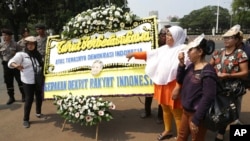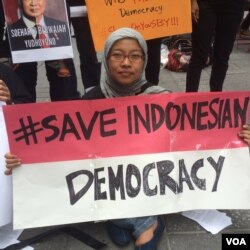A coalition of civil society groups in Indonesia is preparing to fight a controversial new law that abolishes direct elections for local leaders. The groups aim to challenge the new legislation in the nation's Constitutional Court.
Direct elections in Indonesia have been in place since 2005 and have played an integral role in the country’s embrace of democracy.
But in a controversial move, the Indonesian parliament voted late last week to abolish the direct election of local leaders, arguing the system is inefficient and prone to local conflict and corruption.
Under the new law, provincial governors, district chiefs and mayors will be appointed by legislative assemblies, a system that was in place during the reign of former dictator Suharto.
Thirty civil society groups have joined in a coalition to reject the bill, planning in the coming weeks to lodge an appeal at the Constitutional Court.
Titi Anggraini, the executive director of the Association for Elections and Democracy (Perludem), said the legislation deprives citizens of their rights.
“Perludem, together with 29 other civil society organizations… will submit our appeal to the Constitutional Court regarding the enactment of the local election bill because we think this law is against the spirit of the Constitution, where we have the sovereignty of the people. By enacting this law we lose our right to vote and be a candidate, so it is about… basic principles of political rights, the right to vote and right to be a candidate,” said Anggraini.
Anggraini said the coalition will argue the new law effectively denies the rise of independent candidates.
For example, president-elect Joko Widodo, a political outsider, gained widespread public support first as a local mayor in Central Java and then as Jakarta Governor before being elected as the next head of state.
The major criticism of the bill is that the appointment of local leaders will likely be heavily influenced by political party elites.
Political analyst Djaydi Hanan from Paradamina University in Jakarta called the bill a blow to Indonesia’s democratic gains.
“It is quite a setback after the democratic momentum in Indonesia… I would say this is the coming back of the political oligarchy and established elite can now control political process at the local level,” said Djaydi.
While commentators have described the bill as undemocratic, it is unclear a constitutional appeal will be successful. But that has not stemmed public outrage.
In a peaceful protest in Jakarta on Sunday and on social networks in recent days, critics have described the bill as the “death of democracy.”
On Twitter, messages deriding outgoing president Susilo Bambang Yudhoyono, or SBY, saw the hashtag #ShameOnSBY trending worldwide for almost 48 hours.
New York protests
In New York on Monday, a group of 30 Indonesians and Indonesian-Americans gathered with placards, signs and T-shirts on Times Square.
“It’s very important for me,” said a protestor named “Fernando,” a Christian among Indonesia’s Muslim majority. Wearing a loose black ribbon across his mouth symbolizing the silencing of dissent by the government, he said “the people the state legislators appoint don’t really represent us. While we vote for our candidate, the list of candidates is put forth by the party. This is not democratic.”
Other Indonesians attended the demonstration as onlookers. Some were unsure of their position with respect to the issue. One pair of sisters, who had read about the gathering online, was adopting a wait-and-see attitude.
“Perhaps the people in rural areas are not educated enough to choose their own local leaders,” said the younger of the two, “and are willing to be bought off by local chiefs,” adding that “those politicians who are corrupt are the result of direct democracy.”
Yet her sister thinks the right to vote directly should probably come first. The poor and uneducated are likely to vote for leaders who will help them by improving their education too, she asserted, thus making all voters more informed and involved.
President Yudhoyono's reaction
President Yudhoyono is out of the country on his final state visit, but he has also expressed disappointment the law has passed.
In a YouTube video he said he too would lodge an appeal at the Constitutional or Supreme Court. The outgoing president is now expected to cut short his trip to Japan so he can meet with court justices on Wednesday.
Doubts have been raised about the sincerity of the president’s reaction, given he was in a position to stop initial deliberation of the bill and it was his party that allowed the bill to pass after they walked out of parliament and abstained from the vote.
The legislation is widely seen as a sour endnote to Yudhoyono’s decade in power.
The outgoing president, who has overseen a period of economic growth and political stability, will end his term in office on October 20.





